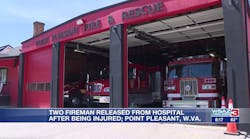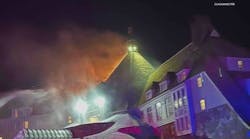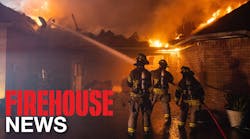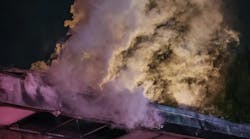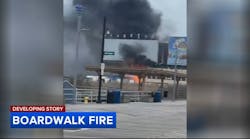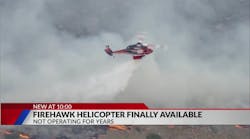In October 2006, long-time International Association of Fire Chiefs (IAFC) Executive Director Garry L. Briese announced that he was resigning to become vice president, Emergency Management and Homeland Security with ICF International as of February 2007. Briese, who had been executive director of the IAFC since 1985, has over 30 years of experience in the fire service as a volunteer chief officer and a paid firefighter. He has a bachelor's degree in international relations from the University of South Florida and a master's degree in public administration from Nova Southeastern University, and holds the Certified Association Executive (CAE) designation from the American Society for Association Executive. In March, the Congressional Fire Services Institute (CFSI) board of directors announced that it would present the 2007 CFSI/Motorola Mason Lankford Fire Service Leadership Award to Briese. Named after the late J. Mason Lankford Jr. and sponsored by CFSI and Motorola Inc., the award recognizes an individual who has been proactive at the local, state or federal government level to raise the awareness and support of fire/emergency services and life safety issues. The interview was conducted by Firehouse Magazine Contributing Editor Charles Werner, chief of the Charlottesville, VA, Fire Department.
FIREHOUSE: What caused you to apply for the executive director position with the IAFC?
BRIESE: Dissatisfaction with the level of willingness of the IAFC at the time to aggressively address the critical issues facing the fire service. I thought that if I could work within the IAFC and I had enough confidence and stamina, then I could change the course of the organization. I guess I was right!
FIREHOUSE: Once you started with the IAFC, was it what you expected? If not, explain.
BRIESE: The worst surprise was the terrible financial situation of the organization. We were basically bankrupt and barely had enough cash to meet the payroll. So, from the very beginning, the challenge for me was to dig the organization out of the financial "red zone" and move us into the "black zone." That took the cooperation of the board, the members, the staff and most of all the patience and unwavering support of our industry partners who exhibit with the IAFC.
FIREHOUSE: What has been the most rewarding experience during your tenure at the IAFC?
BRIESE: Being able to visualize a different future, sharing that vision, developing support and commitment from the board, members and staff, finding funding and then, most exciting of all, watching the evolution of the vision into reality. It is the energy of creation.
FIREHOUSE: What was your greatest IAFC accomplishment and why?
BRIESE: First, the financial recovery and the establishment of a growing financially sound organization. Without revenue, there would not be any IAFC. The IAFC currently must earn 80% of its annual revenue each year; only 20% comes from member dues. That is the number-one accomplishment. Second, the Joint IAFC/IAFF Fire Service Leadership Partnership, because it fundamentally redefined the relationship between labor and management. Third, the Fire Fighter Near-Miss Reporting System, because it demonstrated two key concepts — that an easy-to-use, web-based national incident reporting system was possible, and second, that firefighters are willing to share their stories, fears and lessons so that others will have the opportunity to not make the same mistakes.
The Near-Miss Reporting System is providing as close to near real-time information as we have in the fire service today. It is providing a look into how we operate, how we make decisions, how we use our equipment, how we make mistakes, how we react to when "bad things just happen" and how we can change our education, operations, equipment and command decision processes to prevent near-misses from ever occurring.
FIREHOUSE: What was your most disappointing experience at the IAFC?
BRIESE: Not addressing the essential fundamental structural and governance changes needed in the organization to allow the IAFC to continue the growth and expand the influence. For instance, the IAFC needs to fully embrace the company officer as a member of the IAFC. Company officers are, in my opinion, the single most important position in the fire service. Company officers are on the sharp end of the stick - they lead our operational teams, they establish the tone and tenor of fire department operations on a day-to-day basis. In many ways, the company officer represents the essence of the fire department to the firefighters. And, while the IAFC has made efforts to be inclusive of the company officer, the IAFC has been not changed the governing documents to make the company officer a member of the nation's fire and emergency services leadership organization. But it is the same in our fire departments? Fire chiefs expect the company officer to be on the management team, but then keep distance between the chief officers and the company officers. The IAFC is pretty reflective of the fire service.
FIREHOUSE: Following 9/11, how did your life change professionally and personally and why?
BRIESE: 9/11 caused many in the fire service to re-evaluate who they were and why they were in the fire service. I was no different. I came away from 9/11 recommitted to the future of the fire service and re-committed to expanding the influence of the IAFC as the nation's fire and emergency services leadership organization.
FIREHOUSE: Is there anything that you would change or do differently?
BRIESE: Work harder to maintain friendships and professional relationships. It really is all about relationships. Interpersonal and interorganizational. I believe that I underappreciated the importance of relationships for many years. When I consciously started focusing on building and maintaining relationships, many good things happened, personally and organizationally.
FIREHOUSE: Working with a dynamic and ever-changing board of directors has its own challenges. What have you observed during that process?
BRIESE: Several things. The faces change, but the foundational commitment to the IAFC, from their different perspectives, is always there. One person can make difference. Whether it is an IAFC president, treasurer or board member, each person has the opportunity to make a significant difference. New programs, new policies, new directions often came from one member who happened to be on the board of directors or in a leadership position at the right moment in time. Everyone contributes, some more dynamically than others, but everyone contributes. It has been a basic leadership philosophy of mine that the IAFC executive director and staff always need to remember that the IAFC is the members' organization, it belongs to the members. As committed as staff can be to what they believe to the "best" answer, the final decision always rests with the elected officers and the board of directors.
FIREHOUSE: As part of your IAFC travels, what place that you visited has impressed you the most and why?
BRIESE: As the IAFC executive director, I have been provided the opportunity to travel and visit the fire and emergency services in Israel, Japan, Brazil, Canada, the United Kingdom, Belgium, Germany, Switzerland, France, the Netherlands, Denmark, Sweden and have had excellent international contacts with Australia, New Zealand, South Africa, People's Republic of China, the former Soviet Union, Finland and Mexico. Not to dodge the question about impressions, but each contact taught me ideas and concepts that I have brought back and integrated into my leadership position at the IAFC.
FIREHOUSE: What insights have you gained about the fire service through your experiences at IAFC?
BRIESE: Change usually happens much slower than my expectations. When I first took the executive director position in 1985, I was counseled by a fire chief to always remember that "Change in the fire service comes one retirement at a time." That statement, as troubling as it is, is more accurate than inaccurate.
FIREHOUSE: How have fire service relationships shaped your career?
BRIESE: I am not really sure how to answer this question. The answer is almost like the book The Five People You Meet in Heaven because the relationships and people I think have visibly shaped my career may not be among those "five people" I will meet someday. We are all a product of the relationships we have had in our lives, family, religion, friends, enemies, colleagues, etc. People are the fire service and if you are going to be successful in the fire service, you need to take the time to listen...Listening validates the thoughts and opinions of the other person, and listening tells the other person that you care about them as a person. I need to listen more. "When people know how much you care, then they will care how much you know."
FIREHOUSE: Looking back, what will you miss the most and why?
BRIESE: The day-to-day interactions, conversations and relationships with the staff of the IAFC. The IAFC staff are the most professional, capable and caring association staff that I know. They work every day for the members, for the organization, and for our nation's fire and emergency services. They provide the day-to-day work that keeps the IAFC moving forward. I care deeply about them and know that it takes a committed staff to move things like my visions into real programs and projects. And, the many individual members of the IAFC. The fire service is so very special in so many ways, and the members reflect that completely.
FIREHOUSE: Looking forward, what do you see as a vision for your career?
BRIESE: I firmly believe that you are either moving away from something or moving toward something. I have tried to always choose to move toward something. It is a small difference in mindset, but that small difference makes a huge difference in attitude and outcome. I see myself staying engaged with the broad issues of homeland security and emergency management, and my new position with ICF International reflects that involvement and engagement, but I will always remain connected to the fire service. There's so much more to do!
FIREHOUSE: Will you continue to work with the IAFC and other public safety agencies in your new position?
BRIESE: Yes, in my new position as vice president, Emergency Management and Homeland Security with ICF International, I will continue to work with the IAFC and other key state and national public safety organizations
FIREHOUSE: Your leadership has been instrumental in the fire service's evolution. Is there any chance that you may write a book that would provide guidance to up-and-coming chiefs?
BRIESE: I have co-authored three books, two on first responder emergency medical skills and a firefighter training book called Safe Fire Fighting, and I know the amount of work that it takes to write even a coherent article, much less a book. There is always a chance...
FIREHOUSE: What are your hopes for the fire service?
BRIESE: They are simple, complex and difficult, all at the same time:
- Zero firefighter recruit deaths immediately
- Less than 100 firefighter fatalities per year by 2010
- Less than 75 firefighter fatalities per year by 2015
- Four-person company staffing in all career departments
- Annual physical examinations for all firefighters, career or volunteer
- Implementation of a basic firefighter training program that reaches 80% of all active volunteers instead of holding tenaciously to the current high standard that 80% of all active volunteers will never be able to reach
- Full integration of pre-hospital emergency medical services into the fire service
- Never having another 9/11-type incident
FIREHOUSE: If there is one message that you would like to share to your extended fire service family, what would that message convey?
BRIESE: Keep balance in your life. Never let your job get between you and your family. Treat others as you would like them to treat you. Treasure your real friends; they are few in number. Do your best. Sometimes it really is worth the fight, sometimes it is not. And take lots of pictures.
